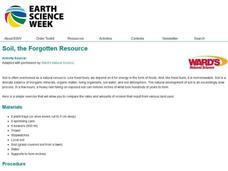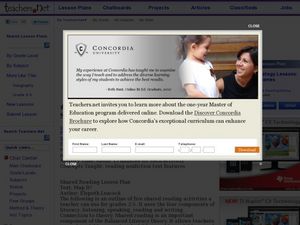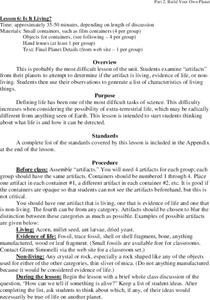Curated OER
Buying New Stuff
Young spenders take a look at the best ways to save and spend money. This type of financial education is lacking in schools, so implementing this lesson would be of great value to your students. Things like bank checking account fees,...
Curated OER
Hey Diddle Diddle
Students discuss their needs to grow and be healthy. They listen as the teacher explains the definition of "organisms" and "nonliving" Students identify organisms in the classroom. They listen to and view a poster illustrating the "Hey...
Curated OER
A Whale of Importance to the Arctic People
The bowhead whale of the Arctic region is of great importance to the people that live there. Your class will brainstorm all they know about this wonderful whale and create an informational video, which they will share with the children...
Curated OER
Soil, the Forgotten Resource
Students discuss soil understanding that is is often overlooked as a natural resource. In this science lesson, students recognize that we depend on it for energy in the form of foods. Students experiment with six boxes of soil to help in...
Curated OER
Insects A-Z!
Alphabet insects! Who has ever heard of such a thing? Get ready because your class is going to research insects that start with a specific letter of the alphabet. In small groups, they'll use the Internet and reference texts to locate...
Pyro Innovations
Beach Exploration
Little ones will absolutely love this instructional activity. It's all about the beach and what they can find while sifting through the sand. A large bucket of sand filled with hidden items is brought into the classroom. Learners will...
Curated OER
Where is DNA found?
In this DNA learning exercise, 3rd graders think about where DNA is found by looking at three possible examples. Student write a short answer to explain where DNA is found.
Curated OER
The Living Environment
Students use a spoon, clothespin, scissors, and toothpicks to simulate how animals get food in their environment. In this environment lesson plan, students learn about the adaptations animals make in order to survive.
Curated OER
Survivor!
Students, in groups, create a project to display examples and non-examples of basic needs. They answer what is needed for basic survival of all living things.
Curated OER
What Does Life Look Like Under a Microscope?
Learners discover cells make up all living things. In this life science lesson plan, students investigate living organisms and the cells that create them. Finally the learners create a testable question, conduct an investigation, and...
Curated OER
Everything in Its Place: Science Classification
Students investigate the system of classification for living things through the sixteen lessons of this unit. The five kingdoms of monerans, protists, fungi, plants, and animals form the basis of several experiments as the similarities...
Curated OER
Breaking the Food Chain
Students investigate the food chain. They brainstorm questions about the human food chain and explain what would happen to living things in the food chain if organisms or resources were removed. They role-play situations in which the...
Curated OER
Dead Trees Alive! Nature Notebook
In this tree worksheet, students find a dead tree or rotting log, describe it and look for signs of living things near it and all animals they find below it.
Curated OER
What Makes Up Rocks and Soils?
For this rocks and soils worksheet, students will complete a Venn diagram comparing the specific characteristics of rocks and soils.
Curated OER
Cricket Wars
Third graders explore living and nonliving things in a garden environment. In this garden environment instructional activity, 3rd graders study the effects of crickets in a garden. Students explore the interaction between living and...
Curated OER
America's Civil Rights Movement, Activity Six
Pupils explore non-violence and investigate the difference between passive and active voice.
Cal Recycle
Conserving Natural Resources
Trying to plan an engaging elementary science unit on natural resources? Conserve your energy! This five-part series of lessons and hands-on activities has exactly what you need to teach young scholars about the importance of conservation.
Curated OER
Turtle Talk
Students watch a Powerpoint Presentation about turtles. They explain that there are 3 types of turtles and where each type lives. They describe a turtle's body and state some things that turtles eat.
Curated OER
Electricity
Learners explore where electricity comes from and how it is used in their everyday lives. Through discussion and hands-on activities, they define electricity and explain how it travels to our homes. Students make informed choices based...
Curated OER
Poetry Reading and Analysis Worksheet
"Things are not what they seem" in this poetry activity, which discusses Henry Wadsworth Longfellow's "A Psalm of Life." Your students will see the world through the eyes of the transcendentalists after analyzing the meaning, context,...
Curated OER
Using Social Studies in Five Shared Reading Lessons: Geography
After several short 15-minute mini-lessons, your learners will gain an understanding of the characteristics of a non-fiction text. Using the book Map It by Elspeth Leacock, your class will become acquainted with non-fiction terms such as...
K12 Reader
Limited Resources
The difference between renewable and non-renewable resources is the focus of a short reading comprehension worksheet that asks kids to respond to a series of questions based on the provided passage.
Curated OER
Is It Living?
Students investigate the definition of life and alive in the context of a unit that is involved with building their own planet. They participate in a class discussion about defining life, and in small groups analyze artifacts to...
Curated OER
Smallest Thing
Students compare characteristics of myobacteria and viruses to determine which is the smallest life form. They read and discuss an article that presents different viewpoints on the definition of life to determine their own viewpoint.
Other popular searches
- Non Living Things
- Non Living Organisms
- Non Living Things
- Laving and Non Living Things
- Lving and Non Living Things

























